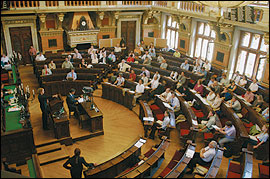 |
Listening, learning, discussingRepresentatives to the Danube River Basin Stakeholder Conference in Budapest June 28-29 work together to find ways to use the rivers of the Danube Basin and to safeguard them for the future. |
 |
Securing economic development
by not overusing
natural resources is one
of the difficulties of the
21st century. Only if we
are able to combine the
two, the principles of the
EU Water Framework
Directive will be put
into practice. |
Public participation is a central element of river basin planning, and
the input of stakeholders is a pre-requisite for developing management strategies
that really work. With these principles in mind, over a hundred representatives
from all over the Danube Basin gathered on June 28-29 in the historic chambers
of the Budapest 5th District City Hall for the first 'Danube River Basin
Stakeholder Conference'.
The aims of the conference were to strengthen the input of interest groups
in the discussions and decisionmaking processes of the ICPDR, particularly
regarding the implementation of the EU Water Framework Directive. "This
conference should not only inform stakeholders, but we would like to go
a step further and enable their active involvement," said István
Öri, ICPDR President.
One river, many interests.
Participants came representing hydropower, flood protection, transport,
nature conservation, mining, fisheries, drinking water, tourism and research.
The discussions in the plenary and in the work sessions focused on possible
conflicts over the use of water resources and such questions as: How can
we guarantee that water used for consumption and irrigation fulfils quality
criteria if too much wastewater still ends up in rivers? How is it possible
to combine modern transport on the Danube with natural river stretches,
which are important for recreation and nature conservation? How can economic
growth be secured without losing the remaining wetlands and floodplains?
During the next four years, all
Danube countries will develop
a 'Programme of Measures' to
fulfil their legal obligation under
the EU Water Framework
Directive. These programmes
will be implemented nationally,
but will also touch upon
issues of basin-wide concern,
such as pollution through hazardous
substances or nutrients
and hydromorphological changes
through dams and weirs
- problems which can only be
solved through the participation
of the different stakeholder
groups from the local level to the entire basin.
Involvement is crucial. "Despite the fact that good activities are
under way in the Danube River Basin, the implementation of the EU Water
Framework Directive requires an even greater involvement of the public –
not only on the international, but even more importantly on a sub-basin
and national level," stated Andras Janossy, from the National Assembly
of the Hungarian NGOs for Environmental Protection and Nature Conservation.
"It is of utmost importance that stakeholders are not only involved
in the discussion of the principles but in the development and the implementation
of the river management plans," he added.
Although nearly half of the Danube Basin is classified as arable land, which
influences rivers through runoff or irrigation needs, the agricultural sector
was not well represented at the conference. However, other chances to cooperate
with ICPDR will be provided, such as a feedback round to the Danube River
Basin Analysis (Roof Report 2004), providing an overview on the impact of
human activities at the basin-widelevel and being the basis for current
ICPDR activities. It is never too late to get active. Visit the
website of the ICPDR and have a stake!